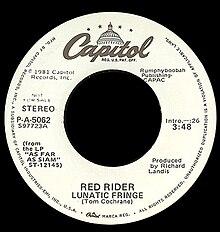music.wikisort.org - Composition
"Lunatic Fringe" is a song by the Canadian rock band Red Rider from their 1981 album, As Far as Siam.
| "Lunatic Fringe" | |
|---|---|
 | |
| Single by Red Rider | |
| from the album As Far as Siam | |
| Released | 1981 |
| Genre | Art rock, hard rock |
| Length | 4:23 |
| Label | Capitol |
| Songwriter(s) | Tom Cochrane |
| Producer(s) | Richard Landis |
| Music video | |
| "Lunatic Fringe" on YouTube | |
The song reached No. 11 on the rock radio airplay chart in Billboard in September 1981,[1] and was awarded a SOCAN Classic award in 2009 by the Society of Composers, Authors and Music Publishers of Canada for reaching the 100,000-airplay mark on (Canadian) domestic radio.[2]
Background
Guitarist Tom Cochrane wrote the song after becoming concerned about a resurgence of anti-Semitism in the 1970s, and was also inspired after reading a book about Raoul Wallenberg, who rescued Jews from The Holocaust during World War II.[3] Some sources[example needed] have incorrectly cited the murder of John Lennon as the song's primary inspiration; Cochrane had already written the song before Lennon was killed, but recorded the song's first demo the evening of the murder. He has stated that his feelings about the event, and how it echoed the theme of his song, galvanized him to release the song as a single despite advice from the record label that the song was not commercial enough.[4]
Charts
| Chart (1981/82) | Position |
|---|---|
| U.S. Billboard Mainstream Rock Tracks[5] | 11 |
| Australia (Kent Music Report)[6] | 52 |
Legacy
In 1997, Tom Cochrane re-recorded the track for his album, Songs of a Circling Spirit, which charted on the RPM Top 100 Singles chart for four weeks, peaking at No. 70.[7][8]
The song's widespread influence inspired Cincinnati's rock radio station WEBN to pay homage to it with the station's early slogan "WEBN, The Lunatic Fringe" introduced in 1984. Then in 1988, this slogan was updated to "The Lunatic Fringe Of American FM", which is still in use as of November 2018. The song was used in the opening scene of Miami Vice Episode 1.15, "Smuggler's Blues" which aired on February 1, 1985; the 1985 movie Vision Quest about a high school wrestler starring Matthew Modine; in the Season 3, Episode 1 closing credits for the HBO series Eastbound & Down;[9] and in the Season 2, episode 6 closing credits for the Netflix series Mindhunter.
In 2009, the song was ranked No. 82 on VH1's 100 greatest one-hit wonders of the 1980s.[10]
References
- Rock Albums & Top Tracks, Billboard, Vol. 93, No. 36, September 12, 1981.
- 20th Annual SOCAN Awards Archived 2012-02-22 at the Wayback Machine, Society of Composers, Authors and Music Publishers of Canada, 2009.
- Bell, Mike: Cochrane finds new meaning, Canadian Online Explorer, December 6, 2002.
- "Rush, Stompin' Tom Connors, Tom Cochrane among SOCAN Award winners" Archived 2009-11-25 at the Wayback Machine. Canadian Press, November 23, 2009.
- "Red Rider". Billboard. Retrieved 27 May 2022.
- Kent, David (1993). Australian Chart Book 1970–1992 (illustrated ed.). St Ives, N.S.W.: Australian Chart Book. p. 248. ISBN 0-646-11917-6.
- "Top Singles - Volume 65, No. 25, August 25, 1997". RPM. 1997-08-25. Retrieved 2009-12-03.
- "Top Singles - Volume 66, No. 1, September 08 1997". RPM. 1997-09-08. Retrieved 2009-12-03.
- "Music from Eastbound and Down S3E01". Tunefind.com. Retrieved 28 December 2021.
- Leah Greenblatt. "VH1's 100 Greatest One Hit Wonders of the '80s: Do You Agree?". Ew.com. Retrieved 28 December 2021.
На других языках
- [en] Lunatic Fringe (song)
[es] Lunatic Fringe
«Lunatic Fringe» (en español: 'Extremista'), es una canción de la banda de rock canadiense Red Rider, extraída de su álbum de 1981 As Far As Siam. El guitarrista Tom Cochrane escribió la canción tras su preocupación por el resurgimiento del antisemitismo en los años 1980. También se inspiró al leer un libro sobre Raoul Wallenberg, quien rescató judíos del Holocausto durante la Segunda Guerra Mundial.[1] Algunas fuentes han citado incorrectamente el asesinato de John Lennon como la principal fuente de inspiración; Cochrane ya había escrito la canción cuando Lennon fue asesinado, pero el primer demo de la canción fue grabado en el día de su muerte. También ha hablado de sus sentimientos sobre el evento, y como hicieron eco al tema de la canción, animándolo a lanzar la canción como sencillo a pesar del aviso por parte de la discográfica de que la canción no era lo suficientemente comercial.[2]Другой контент может иметь иную лицензию. Перед использованием материалов сайта WikiSort.org внимательно изучите правила лицензирования конкретных элементов наполнения сайта.
WikiSort.org - проект по пересортировке и дополнению контента Википедии